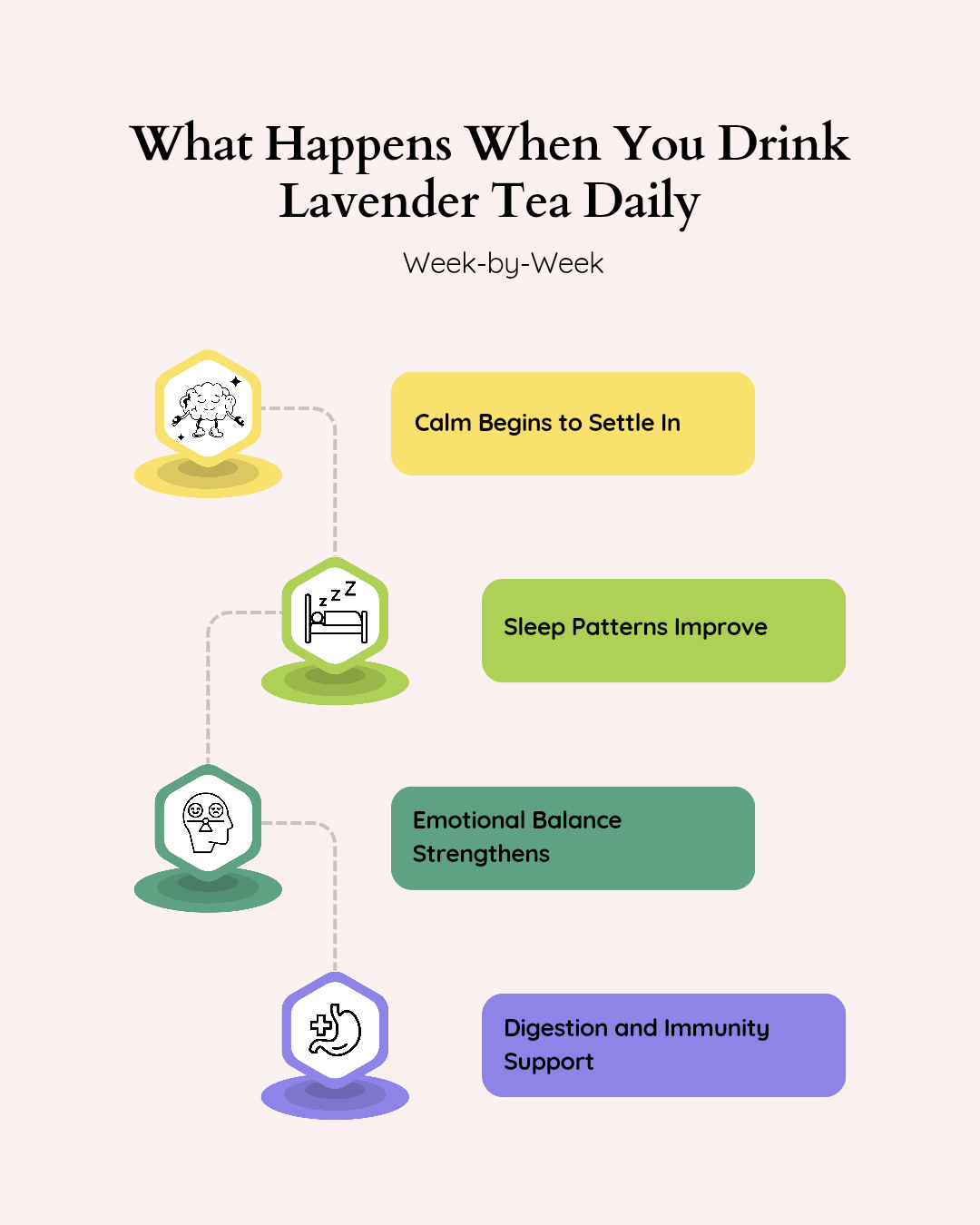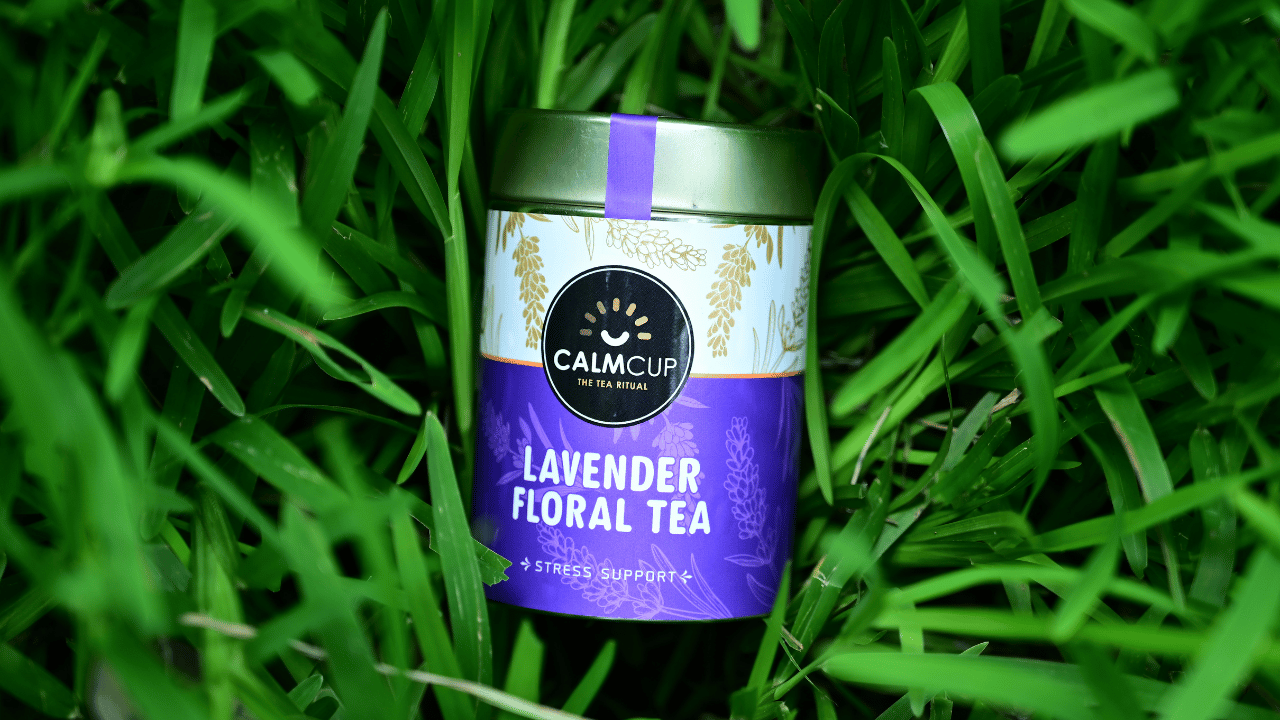Introduction
Some evenings, your mind just won’t switch off—thoughts keep racing, tasks loop endlessly, and sleep feels out of reach. Or perhaps your afternoons drag, and caffeine only gives a fleeting boost. That’s where lavender tea comes in.
This delicate herbal infusion isn’t just about its floral aroma—it’s a mindful daily ritual that helps your body reset, your mind relax, and your mood stabilize. Drinking lavender tea consistently can reduce stress, improve digestion, enhance sleep, and support emotional balance. Think of it as a small, intentional pause in your day—a cup of calm you can rely on.
Top Daily Benefits of Lavender Tea
| Benefit | Why It Matters | Scientific Backing |
| Reduces Stress | Supports the nervous system and lowers cortisol | Front Neurosci, 2021 |
| Improves Sleep Quality | Promotes natural sedation and enhances sleep cycles | J Altern Complement Med, 2015 |
| Aids Digestion | Reduces bloating, cramping, and gut tension | Phytother Res, 2004 |
| Balances Mood | Enhances serotonin activity | Int J Psychiatry Clin Pract, 2012 |
| Antioxidant Boost | Fights free radicals and supports immunity | Food Chem Toxicol, 2010 |
The Health Science of Lavender Tea
Lavender tea is a gentle yet powerful ally for well-being, supporting the nervous system, aiding digestion, and promoting emotional balance.
Its vibrant purple blossoms and calming aroma have captivated people for centuries, forming the foundation of one of the world’s most soothing herbal teas.
Lavender’s potency comes from linalool and linalyl acetate, which give it its signature fragrance and offer antioxidant, anti-inflammatory, antidepressant, and neuroprotective benefits. Linalool, in particular, reduces anxiety, enhances calm, and supports social ease.
Other compounds like lavandulol, lavandulyl acetate, β-ocimene, and α-terpineol further contribute to wellness—lavandulyl acetate aids falling asleep, while β-ocimene promotes deeper, uninterrupted rest. Together, they make lavender tea a natural way to nurture both body and mind.
What Happens When You Drink Lavender Tea Daily: Week-by-Week

Week 1: Calm Begins to Settle In
Notice subtle relaxation replacing tension
Mild reduction in daily stress and mental clutter
Slight improvement in digestion; bloating may decrease.
Week 2: Sleep Patterns Improve
Falling asleep becomes easier and deeper
Night time awakenings may reduce
Mood begins to stabilize; anxiety and irritability slightly ease
Week 3: Emotional Balance Strengthens
Cortisol and stress hormones start to balance
Improved serotonin activity enhances overall mood and motivation
Afternoon slumps become less pronounced
Week 4: Digestion and Immunity Support
Digestive discomfort such as cramps or bloating continues to decrease
Antioxidants begin to have cumulative effects, supporting immunity
You may feel a calmer baseline throughout the day
Beyond Week 4: Lasting Wellness
Sleep, mood, digestion, and calm become habitual
Lavender tea becomes an anchor in your daily routine—a signal of rest, relaxation, and self-care
Long-term consumption supports emotional resilience and overall well-being
How to Add Lavender Tea into Your Daily Routine
| Time of Day | Ritual Suggestion |
| Morning | Replace your second coffee with warm lavender tea. Take 5 minutes to breathe and set intentions. |
| Post-Lunch | Brew iced lavender tea to prevent afternoon fatigue and stay focused. |
| Evening | Pair a cup with journaling, meditation, or calming music to transition from work to rest. |
| Bedtime | Blend with chamomile or lemongrass for deeper relaxation before sleep. |
The magic of lavender tea lies in these small, repeatable rituals that signal your body and mind to slow down.
Lavender vs. Other Herbal Teas
Lavender tea sets itself apart from other sleep-promoting herbs with a dual-action approach. While chamomile primarily acts as a mild sedative, lavender addresses the root causes of sleep difficulties by reducing anxiety and regulating stress responses. Unlike prescription sleep aids, lavender tea is natural and non-habit forming, making it an ideal choice for nightly relaxation.
Real-Life Lavender Rituals from Calm Cup Lovers
“My night routine now ends with lavender tea and silence. Game changer for my sleep.” – Megha, Bangalore
“Sipping lavender tea before bed has helped me finally fall asleep without tossing and turning.” – Rahul, Delhi
FAQs About Daily Lavender Tea
1. Can I drink lavender tea every day? Yes, 1–2 cups per day are generally safe. Start with small amounts if you’re new to herbal teas.
2. Will lavender tea make me sleepy during the day? Not usually. Moderate consumption promotes calm rather than drowsiness. Evening consumption is best for sleep benefits.
3. Can I mix lavender tea with other herbs? Absolutely. Lavender blends beautifully with chamomile, lemongrass, and peppermint to enhance relaxation and digestive support.
4. Is lavender tea safe for children? Small amounts are generally safe for older children, but consult a pediatrician for daily use or if your child has allergies.
5. Can lavender tea help with anxiety? Yes. Lavender compounds interact with neurotransmitters, supporting emotional balance and reducing mild anxiety symptoms.
6. Can lavender tea interact with medications? If you are taking sedatives, blood pressure medications, or other herbal supplements, consult your healthcare provider before daily consumption.
Conclusion
Lavender tea is more than a fragrant cup—it’s a daily ritual that nurtures your mind, body, and soul. By drinking it consistently, you can experience reduced stress, better sleep, improved mood, digestive support, and antioxidant protection.
Start small, follow the week-by-week progression, and notice how your body responds. Over time, lavender tea can become your daily anchor for calm, balance, and wellness.
Ready to embrace calm daily? Choose Calm Cup’s 100% Natural Lavender Tea and make serenity a part of your everyday life.

